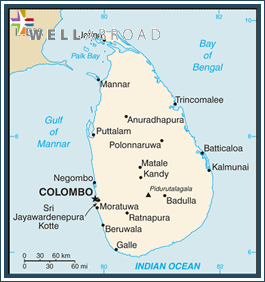|
MOST RECENT ALERTS
There's no recent alert.
|

|
|||||||||||||||
| COUNTRY OVERVIEW | ||||||||||||||||
|---|---|---|---|---|---|---|---|---|---|---|---|---|---|---|---|---|
|
| COUNTRY GENERAL INFORMATION | |||||||
|---|---|---|---|---|---|---|---|
| Language: |
Sinhala (official and national language) 74%, Tamil (national language) 18%, other 8%
|
||||||
| Currency: | Sri Lankan Rupee (LKR) | ||||||
| Predominant Religions: |
Buddhist 69.1%, Muslim 7.6%, Hindu 7.1%, Christian 6.2%, unspecified 10% |
||||||
| National Holidays: | Independence Day, 4 February (1948) | ||||||
| Economic Status: |
In 1977, Colombo abandoned statist economic policies and its import substitution trade policy for more market-oriented policies, export-oriented trade, and encouragement of foreign investment. Recent changes in government, however, have brought some policy reversals. About 800,000 Sri Lankans work abroad, 90% of them in the Middle East. They send home more than $1 billion a year. The struggle by the Tamil Tigers of the north and east for an independent homeland continues to cast a shadow over the economy. |
||||||
| Security: |
Sri Lanka Army, Sri Lanka Navy, Sri Lanka Air Force. |
||||||
| US Presence: | |||||||
| Document Requirements: |
A passport and onward/return ticket and proof of sufficient funds are required. A no-cost landing visa, valid for 30 days, will be granted only to tourists at the time of entry into Sri Lanka. Business travelers are required to have a visa prior to arrival. Individuals traveling to Sri Lanka for purposes other than tourism (e.g., religious work, volunteering or working) must obtain an entry visa from the nearest Sri Lankan Embassy or Consulate before their arrival in Sri Lanka. Foreigners entering Sri Lanka on a landing/tourist visa cannot convert their visa to a non-tourist one, and risk deportation if they engage in activities other than tourism without the appropriate visa. Visitors staying more than 30 days for any purpose must obtain a visa extension from the Department of Immigration and Emigration in Colombo and pay the relevant visa fees. Travelers must have yellow fever and cholera immunizations if they are arriving from an infected area. Sri Lankan law requires all foreign guests in private households to register in person at the nearest local police station. Individuals who stay in private households without registering may be temporarily detained for questioning. This requirement does not apply to individuals staying in hotels or guesthouses. There are no specific HIV/AIDS entry restrictions for visitors to and foreign residents of Sri Lanka. However, Sri Lankan law does allow immigration officials to refer visitors and foreign residents to a physician for examination if a public health risk is suspected. In practice this is a rare occurrence, but travelers should be aware that Sri Lankan law allows for the denial of entry to any foreigner who, upon referral from an immigration officer, is certified by a physician as posing a public health risk. Travelers who refuse a medical examination under these circumstances may be refused entry. Please verify this information with the Embassy of Sri Lanka before traveling. Information about dual nationality or the prevention of international child abduction can be found on our website. For further information about customs regulations, please read our Customs Information page. |
||||||
| Major Airports: |
Airports: 18, Airports w/paved runways: 14 Bandaranaike International Airport (CMB/VCBI) |
||||||
| Servicing Airlines: |
|
||||||
| Risks and Precautions: |
US Dept. of State Travel Warning Updated 26 June 2009. http://travel.state.gov/travel/cis_pa_tw/tw/tw_3011.html The Department of State warns American citizens traveling to or living in Sri Lanka about the potential for continued instability, including possible terrorist attacks. This replaces the Travel Warning for Sri Lanka dated December 22, 2008, to update information on security incidents, safety concerns in specific regions of the country, and potential problems for U.S. citizen travelers. As the Department continues to develop information on any potential security threats to U.S. citizens overseas, it shares credible threat information through its consular information documents, including the Country Specific Information for Sri Lanka and the Worldwide Caution, available on the Internet at http://travel.state.gov. Travelers may obtain up-to-date information on security conditions by calling 1-888-407-4747 toll-free in the United States and Canada or, outside the United States and Canada on a regular toll line at 1-202-501-4444. These numbers are available Monday through Friday, 8:00 am to 8:00 pm (except U.S. federal holidays). |
||||||
| Mortality Statistics: |
Infant MR total: 19.01 deaths/1,000 live births |
||||||
| Immunization Indicators: |
Required: None |
||||||
| Infectious Disease Concerns: |
degree of risk: high |
||||||
| Overall Quality of Medical Services: |
Medical facilities outside Colombo are limited. The U.S. Embassy maintains a list of private physicians who may be consulted. Medical supplies are uneven; travelers should carry any special medications with them. There are six large hospitals in the Colombo area, including three with emergency trauma service-- Asiri Hospital, Apollo Hospital, and the government-run General Hospital. Serious medical problems may require evacuation to the United States or to the nearest country where adequate medical facilities or treatment is available, usually Thailand or Singapore. Neither Thailand nor Singapore requires American citizens to have an entry visa. |
||||||
| Providers in Network: |
|
||||||
| Recent Medical Threats/ Concerns/Warnings: |
Indigenous wild polio was present in 2005-2006 in India, Pakistan, and Afghanistan; cases from Bangladesh and Nepal were confirmed in 2005-2006. |
||||||
| Communications Info: |
Country Code: +94 |
||||||






